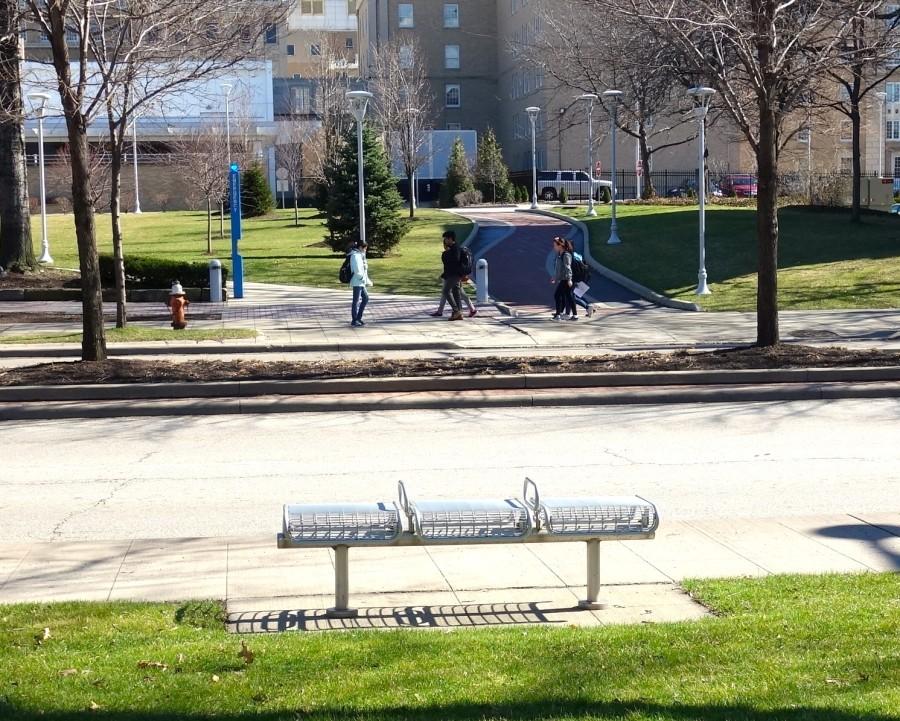Lehrer: Seeing, then experiencing, misplaced justice
Case Western Reserve United
A bench on Euclid Avenue near Thwing Center. Society should support and correct, not shun, as a means of justice.
The way the United States’ justice system accomplishes corrections and punishments is a topic that needs discussion on a national scale. But imagine my surprise when I saw the detrimental effects of the current system’s underlying ideology on campus.
I’ll get straight to it: I was unjustly expelled from a Greek Life organization here that I participated in and contributed to since my first year at Case Western Reserve University. I had just come back from spring break where I co-site led a Center for Civic Engagement and Learning Alternative Spring Break trip dedicated to learning about and advocating for criminal justice reform.
An aspect that was especially influential during the trip was working with previously-incarcerated individuals who are now employed by and doing great things at these nonprofits. The individuals I met were incarcerated for a long time; one was wrongfully convicted and imprisoned for nearly 30 years.
We served in southeast parts of Michigan, including Detroit, Ypsilanti and Ann Arbor. We were empowered with a number of tools to further educate ourselves on an issue so prevalent, yet so complicated.
I’m not saying that my privileged situation can be compared to those I met over break. Further, what I did was misguided and wrong, no doubt about it.
What happened to me, however, has helped me gain perspective on the systemic flaws in our country’s current judicial system. My expulsion resulted from a deeply mishandled process, wherein many things were taken out of context and I was not given my right to appropriate due process. But even more, this Greek organization practiced the dishonorable policy of “zero tolerance.”
I had not been made aware of previous patterns of misconduct as the judicial board and the Greek organization mentioned in their decision. The record shows that I had never come before this board officially for anything in the past. I had no chance to realize and try to correct my behaviors.
When you analyze it from a justice perspective, my expulsion was strictly punitive in nature, with no evidence of an attempt at rehabilitation or rectified conduct.
During spring break, we primarily worked with two nonprofits that support and advocate on behalf of prisoners while incarcerated. They help with prisoners’ complaints, try to assist with connecting prisoners to services and resources and empower them to express their past and current struggles.
There were two men who had been imprisoned for many years, the one I mentioned who was wrongfully so and another who had committed a crime. Not only are they working hard on the “frontlines” for the cause, but they went through the process and know the “ins and outs.” They are now going on to serve in national task forces and earning law degrees to be better equipped to reform the system.
During the trip, we talked about a lot of issues associated with criminal justice and prisons. A few particular ones were the importance of re-entry and job placement, allowing the criminally convicted to have access to employment opportunities and the perils of solitary confinement.
The trip also gave me a new outlook on injustice that leads to harmful treatment and feelings of isolation that adversely affect minority groups in America. The trip was called “Beyond ‘Orange is the New Black:’ Mass Incarceration in the U.S.,” hoping to to dispel any stereotypes that are portrayed inaccurately in the media.
We need to all remain cognizant of the problems with disciplinary actions. Others deserve the opportunity to further grow and learn from their mistakes.
I am glad I no longer have to affiliate myself with this Greek organization after these past few weeks. The entire process of my expulsion, if anything, made me learn how to cope with undue levels of stress, how to seek counsel from friends who could assist and how to advocate for myself. The members of this Greek organization did not treat me with dignity and fairness; a community is about nurturing and supporting someone even when he or she “slips up.”
Whether discussing criminal justice on a national scale or just extracurriculars, it’s on all of us to try to ameliorate someone’s negligence or naivety. Even when we engage in something that is not okay, that one blemish should not be turned into a deadly blow. That is what community is about; I saw and now have experienced that shunning does no one good.
Instead, when I was expelled, the rationale provided was that it would be “an educational matter” for me, and that I hadn’t accepted the “consequences as a man.”
Josh Lehrer is a fourth-year student who is excited about committing himself to a year of public service after graduation.


